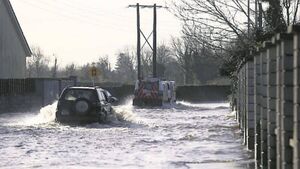Cost of Mountmellick Flood Relief Scheme now €20 million, says Laois TD

The scene of flooding that hit Mountmellick in November 2017
IT’S eight years on since floods damaged residential and business premises in Mountmellick and it could take up to another even years to complete the construction work necessary to protect the town from further flooding.
That according to Independent Republican TD Brian Stanley who said that the timeline for the scheme of works in Mountmellick, and similar ones in Portarlington and Clonaslee, needs to be shortened.
He made the comment following a meeting he had with senior officials from An Commissiun Pleanála and Laois County Council.
He said: “While some progress is being made, it’s welcome that Laois County Council are now ready to seek planning approval from the An Commissiun Pleanála.
“All environmental, hydrology reports, surveys, studies and the preferred option and design of the scheme have been completed, including where the walls and embankments will be constructed. A total of seven kilometres of walls and embankments will be put in place. Some of these barriers will be up to 9 feet in height.”
He said: “The council state that the new scheme will protect 165 businesses and homes in Mountmellick from flooding. This is based on a 100-year risk of flooding. Also in the plan is the removal of the old Owenass historic bridge at Derrycloney and the acquisition or compulsory purchase of 18 acres of land and the construction of a pumping station at Davitt Road.”
“It is clear from the update from the An Commissiun Pleanála and Laois County Council senior engineers,” said Deputy Stanley, “that the process around the various stages of the project is taking far too long and is completely unacceptable. This timeframe could be reduced by giving more powers, in terms of contract management, to qualified engineers in the local authorities.”
“It has been eight years since the bad flooding in Mountmellick, and it could take another six to seven years to get to the final completion of construction work. Meanwhile, there is a risk of further flooding to homes. Many of these households can no longer get flood insurance. Those residents whose homes were severely flooded in the past are very concerned. To mitigate against the risk of flooding in the interim, the council has committed to maintaining the waterways in and around the town.
“The overall cost of the scheme has now increased significantly. The original cost was estimated to be between €6 to €9 million. That figure has now increased due to extensions and extra works required, delays and construction cost inflation and the estimated cost could be up to €20 million, according to the meeting.”
He said that unless the length of time is shortened between a flood relief scheme been approved and construction being completed, “these schemes will go on forever.”




